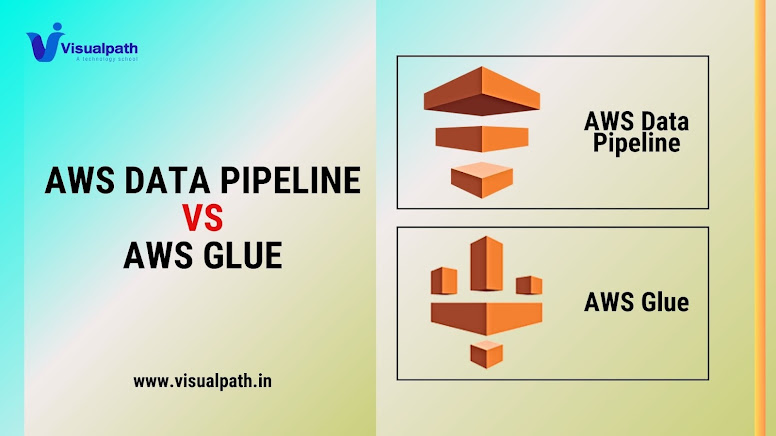AWS Data Pipeline vs AWS Glue: A Comprehensive Comparison | 2024
AWS Data Pipeline vs. AWS Glue:
In the realm of data engineering, AWS offers multiple tools to manage and process data. Among these, AWS Data Pipeline and AWS Glue are two prominent services. Understanding their differences, strengths, and ideal use cases can help organizations choose the right tool for their data workflows. AWS Data Engineer Training
Service Overview
AWS Data Pipeline is a web service designed to automate the movement and transformation of data. It allows users to define data-driven workflows that can move and process data across AWS services and on-premises data sources. AWS Data Pipeline supports scheduling, retry logic, and fault tolerance, making it suitable for long-running, periodic data processing tasks.
AWS Glue is a fully managed ETL (Extract, Transform, Load) service that simplifies the process of preparing data for analytics. It automatically discovers and catalogs data, generates code to transform the data, and makes it available for querying and analysis. Glue integrates tightly with AWS data lakes and analytics services, making it ideal for complex data integration tasks. AWS Data Engineering Training in Hyderabad
Key Features and Capabilities
Data Ingestion and Integration
- AWS Data Pipeline: It supports various data sources, including Amazon S3, Amazon RDS, DynamoDB, and on-premises databases. Users can create pipelines to copy data between these sources, transform it using scripts or AWS services like EMR, and load it into target data stores.
- AWS Glue: Glue excels in data discovery and integration. It includes a data catalog that automatically detects and catalogs data across your AWS environment. Glue can extract data from various sources, transform it using Apache Spark, and load it into data lakes or data warehouses.
Data Transformation
- AWS Data Pipeline: Users can define custom data transformations using scripts written in languages like Python and Ruby or leverage services like AWS EMR for more complex processing. It provides flexibility but requires manual management of transformation logic.
- AWS Glue: Glue simplifies transformation with an auto-generated Spark ETL code based on the schema and data types in the data catalog. It also supports custom transformations using PySpark, allowing users to write custom ETL scripts within the Glue framework.
Scheduling and Workflow Management
- AWS Data Pipeline: It provides robust scheduling capabilities, allowing users to define when and how often their data workflows should run. It also includes features like retry logic, failure handling, and dependency tracking to ensure reliable data processing.
- AWS Glue: Glue also supports scheduling, but it is more focused on on-demand data processing triggered by events or API calls. Glue workflows can be managed through its integrated scheduler, which simplifies the orchestration of complex ETL jobs. AWS Data Engineering Course
Performance and Scalability
- AWS Data Pipeline: It is designed for scalable data processing, but performance tuning often requires manual intervention and optimization. Users need to manage the underlying infrastructure and ensure their pipelines can handle varying data volumes.
- AWS Glue: Glue is built on a serverless architecture, automatically scaling to handle large data volumes. It abstracts infrastructure management, allowing users to focus on ETL logic rather than performance tuning.
Cost Considerations
- AWS Data Pipeline: Pricing is based on the number of pipeline objects and the frequency of their activities. Users pay for the resources consumed by the underlying infrastructure, making cost management a bit more complex.
- AWS Glue: Pricing is straightforward, based on the amount of data processed and the duration of ETL jobs. The serverless model often results in cost savings, especially for sporadic or variable workloads.
Security and Compliance
Both services offer robust security features, including encryption at rest and in transit, IAM policies, and integration with AWS Key Management Service (KMS). AWS Glue's tight integration with AWS Lake Formation enhances its security and compliance capabilities, making it easier to manage data access and governance. AWS Data Engineering Training Institute
Conclusion
AWS Data Pipeline and AWS Glue serve distinct purposes within the AWS ecosystem. AWS Data Pipeline is ideal for users needing flexible, customizable data workflows with robust scheduling capabilities. It excels in scenarios requiring complex, periodic data processing across various data sources.
AWS Glue, on the other hand, is perfect for users looking for a managed, scalable ETL solution that simplifies data integration and transformation. Its automatic schema discovery, serverless architecture, and tight integration with AWS analytics services make it a powerful tool for building data lakes and preparing data for analysis.
Visualpath is the Best Software Online Training Institute in Hyderabad. Avail complete AWS Data Engineering with Data Analytics worldwide. You will get the best course at an affordable cost.
Attend Free Demo
Call on - +91-9989971070.
WhatsApp: https://www.whatsapp.com/catalog/917032290546/
Visit blog: https://visualpathblogs.com/
Visit https://www.visualpath.in/aws-data-engineering-with-data-analytics-training.html

.jpg)

Comments
Post a Comment